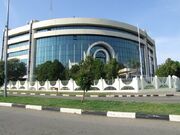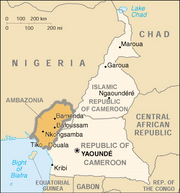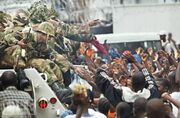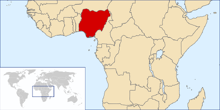Unity and Faith, Peace and Progress | |||||||
| Capital | Isheyemi | ||||||
| Largest city | Lagos | ||||||
| Language | English, Hausa, Igbo, Yoruba | ||||||
| Legislature | Presidential Federal Republic | ||||||
| Area | 923,768 km2 | ||||||
| Population | 142,729,000 | ||||||
| Independence | from Great Britain | ||||||
| recognized | Oct 1, 1960 | ||||||
| Currency | West African Franc | ||||||
Nigeria is a nation located in West Africa, the most populous nation in Africa, and founding nation of the West African Union.
History[]
Post Doomsday - Road to Change[]
In the years following Doomsday the government of Shehu Shagari continued its corrupt policies and with the loss of any foreign aid, began squeezing the populace more than before. Maintaining one of the larger oil reserves in the eastern hemisphere benefited the Nigerian economy greatly as prices skyrocketed.

Ishe Adeyemi
High level officials in the government used this boom to fill their own pockets and those of their friends while the people suffered. In 1984 Shehu Shagari was re-elected president in what was largely regarded as a fraudulent election. Rather than demand another election, plan a coup, or other such responses, one opposition leader, a lesser known western educated man named Ishe Adeyemi took the road of calmly pointing to the fraudulent election as sadly common of African nations. That as long as African leaders are only in it for themselves, Africa will never be taken seriously.
Adeyemi was a supporter of Pan-Africanism, but believed that to achieve such a goal, some changes needed to happen with its people. Attending university in Oxford studying law and political science, Adeyemi laid out reforms he believed would put Nigeria on the right track to a stable, effective government, as well as to avoid the long tradition of military coups common to African nations. His reforms included an emphasis on quality public education as vital to economic stability, and harsh penalties for corruption crimes to curb the rise in government and business corruption. The economic and political goals and the outlines of how to achieve such goals began to be known as Adeyemism . He began a tour of the nation, making public appearances and speaking of his dreams of an African nation finally taking its place as a leader of the world. He spoke of how the destruction of the west was Africa's time to shine, and that Nigeria could be the beacon that the rest of the continent could follow. His speeches were rousing and had a passion that ignited the long dormant fires within the people of Nigeria. As time passed and he became more and more popular, his ideas becoming more and more widespread, Shagari decided that rather than deal with the outcry after another election, he would end the threat and have Adeyemi killed. Unfortunately for Shagari, the assassination would not go as planned. On March 29th 1985, during a speech that had managed to get the attention of television news, Adeyemi was shot on live television. The shooter was captured by Adeyemi supporters and forced to reveal his orders. Soon the news spread to radio, and then word of mouth. Shagari had killed the man that dared dream of a greater Nigeria.
Adeyemi Uprising - Birth of a New Nigeria[]
Adeyemi's death had an uncommon effect on the populace, it united. Many of the ethnic groups who had fought and hated each other for years were brought together by their anger over the death of a man they believed could have brought Nigeria into an age unheard of in Africa. Small bands of armed rebels began appearing all over the country. Several of the professional military units stationed around the country, rather than putting down the rebellions, joined them. Within six months rebel armies controlled all of the north and east of Nigeria encircling Lagos. Shagari was captured by a joint force of three rebel armies on Nov 3rd 1985 where he surrendered. With no clear leader in the rebellion, being made up of several rebel armies, it was agreed to follow Adeyemi's planned reforms. A provisional government was formed on Nov 17th to facilitate the reforms to the Nigerian government system and rewrite parts of the constitution. Harsh anti-corruption laws were put in place in order to send a message that this was not a new face on old ways. The military was reformed to establish rotating commanders for the armed forces as well as nationalist training programs to instill a loyalty to the state rather than the commanding officer. This was hoped to curb the trend of military coups. Elections were held in July 1986 and were widely regarded as fair and free. The next few years the new government had its hands full putting down small rebellions and instituting many economic reforms. With plenty of money coming in from oil exports to the ANZC, India, and other African nations, a hugely reformed public school system was put into effect. Construction of the initial phases of Abuja was completed in 1988, and the project was renamed Isheyemi in honor of the man who had shaped the nation, the capital was officially moved there in 1989.
West African Union[]
With the economy on the rebound, the military modernizing, and Nigeria's future secure, it was time to look outward to establish relations with the remains of the world and bring Nigeria to its rightful place as a world leader. Building on Adeyemi's goals of a glorious Africa, the Nigerian government began looking into the situations of nearby nations. Of all the West African nations only Ivory Coast and the Senegambia confederation were in line with the goals and motives of the new Nigerian government and Nigerian diplomats aggressively pursued strong relations. In 1989 the West African Cooperative Treaty was signed in Yamoussoukro coordinating defense and trade between the three nations and outlining joint foreign policy goals. Nigerian diplomats began outlining the goals of Adeyemi and the reforms he had outlined that had been so successful in Nigeria. The first goal of this alliance was to strengthen its members and begin aiding other nearby nations and spreading Adeyemism to the chaotic and undemocratic of those nations. The first target of this was Ghana.

West African Union headquarters in Lagos.
While mostly stable, Ghana had undergone severe economic collapse due to its leadership and the effects of Doomsday. Nigeria, Senegambia, and Ivory Coast came to its leader, Jerry Rawlings, with a proposal. Adopt the reforms of Adeyemism and give free elections, and aid will be provided for economic reconstruction etc. Seeing this as the only way to save himself from a bloody coup, Rawlings agreed. This served to strengthen ties between the four nations and while economic recovery was slow, it was noticeable, enough so that Rawlings was able to win the first election in 1993. With Success in Ghana, and its signing of the WAC Treaty, the four turned their eyes on Togo, a land of much agricultural land but little development.
With the destruction of much of the heavily industrialized farmland during Doomsday, there were worldwide food shortages and this was a market that could not be ignored. The WAC Treaty signatories began putting pressure on Togo, a smaller West African nation who's economy was mostly dominated by subsistence farming. Thought initially resistant, heavy propaganda campaigns within Togo by the WAC signatories moved public opinion of the aid offered in favor, and as signed establishing the West African Union with Ghana, Ivory Coast, Nigeria, Senegal, and Togo as the founding members.
Ambazonian Occupation[]
With the West African Union adding The Gambia in 2000, Nigeria began looking eastward to spread its Adeyemist ideals. Cameroon had largely been in a state of flux since Doomsday and the Anglophone population of southwestern Cameroon declared their independence as the Republic

The situation in Cameroon as of 2002
of Ambazonia in 2001. The territory is claimed by both the Republic of Cameroon to the southeast, and the Islamic Republic of Cameroon (IRC) to the northeast. Though the fighting is three way, fighting between Cameroon and the IRC has reached a stalemate, and Ambazonia feared it would become the battleground for the other two states as they fought for control. In 2002 as fighting entered Ambazonia the government appealed to Nigeria for aid. With most of the other West African Union members dealing with problems in the western corner of Africa, Nigeria agreed to aid Ambazonia alone. Nigerian troops crossed the border into Ambazonian territory in September of 2002. Cameroon and the IRC both viewed this as an act of war and as the fighting between them had stagnated, they declared an uneasy peace to focus their efforts on the larger threat of Nigeria. Initial fighting was hindered by the Ambazonian's lack of organization and resistance to turn over control of the war to the Nigerian military.

Nigerian troops are greeted by Ambazonian citizens.
This lead to several operations being spoiled by premature Ambazonian offensives, retreats, and several botched operations leading to lost territory. June 2003 Nigerian leadership decided that the Ambazonian people deserved their freedom, but without organization or proper cooperation it couldn't happen. Nigerian military seized control of all Ambazonian military facilities and forced all Ambazonian troops under Nigerian command. All those who resisted were arrested.
Ambazonia was declared a Nigerian protectorate until the war was over and a shift to an organized civilian government could be implemented. There was some resistance to the move both in Nigeria and Ambazonia, but it eventually proved to be the right course of action. With the newly organized troops joint Nigerian/Ambazonian forces were able to push any Cameroon/IRC forces out of the region. A ceasefire was declared August 2005 and Nigerian forces began constructing a border fence 50 km outside Ambazonian territory. While this angered both Cameroon and the IRC, their forces were in no state to resume hostilities. Nigerian aid began to come into Ambazonia and a constitution was written with the goals and values of Adeyemism as its basis. Nigerian troops began training police and military for an eventual handover of control. On May 22nd 2009 an official peace treaty between Nigeria, Ambazonia, Cameroon and the IRC was signed, the same day control of Ambazonia was handed over to a provisional civilian government, with elections to be held in July.
Current Situation[]
Nigeria continues to be a prominent member of the West African Union, promoting democracy and effective government in the region.
Economy[]
The economy of Nigeria has undergone massive reforms in current years. Over-reliance on oil exports led to some economic decline in the years after doomsday but following the Adeyemi Revolution the country began to undergo massive economic diversification. With Nigeria's abundant mineral wealth the mining industry has become one of the dominant sectors of the economy. Agriculture has also seen a large boost in part due to government work placement programs, which aimed to move poor urbanized citizens to rural areas where higher paying jobs were becoming more plentiful.
With most of the major automobile manufacturers destroyed on Doomsday, Nigeria managed to maintain a small automotive manufacturing industry with Peugeot and Isuzu manufacturing plants. The Nigerian branches of these companies have now expanded and are some of the top exporters of automobiles in the world.
The Nigerian film industry has seen major advancement in recent years due to the destruction of the United States and the instability plaguing India. While normally reliant on off the shelf equipment, the rise in the Nigerian economy has led to some more advanced film making, and the country's first major movie studio, Nollywood Pictures, began operations in 2008.
Major exports include Oil, Automobiles, Automotive parts, Cocoa, Rubber, Films, Citrus Fruit, Sugar.
Foreign Affairs[]
Nigeria is currently a member of the League of Nations



